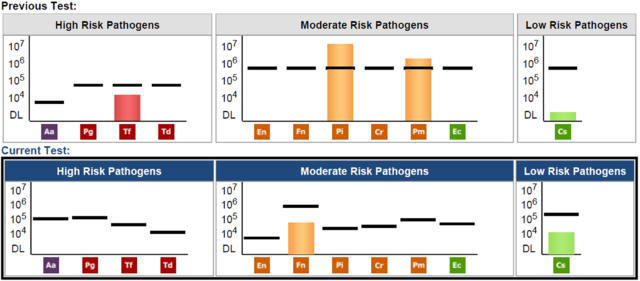Refusal to Provide Implant without Periodontal Treatment
October 20, 2017 (PRLEAP.COM) Health News
A missing tooth distracts from a smiling face and patients naturally want a full smile. A dental implant creates a stable restoration that looks, fits and functions like a natural tooth. In this award-winning case study, Dr. Jim McCreight refused to provide an implant without first addressing the patient's underlying gum disease. The patient was not happy, but, as McCreight recounts, "I could not in good conscience provide an implant in a diseased environment."The patient had had extensive dental work done by a previous dentist. He came to McCreight Progressive Dentistry asking for an implant. At the comprehensive exam, significant plaque build-up, staining, pocket depths up to 5mm, and heavy, generalized bleeding upon probing were noted. Bacterial testing indicated high pathogen levels. Radiographs showed generalized bone loss. McCreight diagnosed advanced gum disease and explained that the disease threatened the success of the implant. He refused to provide it without corresponding periodontal therapy. The patient was shocked, both by the diagnosis and the refusal. He stormed out of the office.
Periodontitis remains one of the most underdiagnosed conditions in dentistry. According to the Centers for Disease Control and Prevention, 47% of American adults have chronic periodontitis. McCreight Progressive Dentistry is recognized with this award not only for the excellent care they provided but also for their patient education and their careful attention to gingival health.
"This was a particularly tough case," says McCreight "because the patient did not know he had gum disease. He did not want to hear this. He just wanted an implant, but I refused to take his money for the implant until the gum disease was under control." Eventually the patient came to terms with the condition and returned to the office to discuss his options.
Treatment started with homecare instructions using prescription Perio Trays and four quads of scaling. After two cleanings and two weeks of Perio Tray homecare, Jessica Berthelson, RDH noted "remarkable change in gum tissue response, much less bleeding and inflammation. The patient reports gums feeling better as well." Six weeks later the results were even better, with significantly less bleeding. The patient was instructed to drop tray usage at home to once a day at 15 minutes.
The prescription tray homecare is important because it is the only way to easily and reliably modify the biofilm in periodontal pockets at home. The Perio Tray delivers medication deep below the gums and keeps it there long enough to reduce bacterial loads and encourage a healthy environment. Within weeks of starting treatment, there was a 77% decrease in bleeding, less plaque, and much healthier gum tissue tone and color. A year later, the pathogen testing indicated significant reductions in bacterial loads, indicating long-term success.
The Orkos Award was developed by Perio Protect to recognize excellence in case study for treatment of gingivitis and periodontitis. The McCreight Progressive Dental team's dedication to patient health, as indicated in this case study, involves extra time to help patients understand and accept their need for treatment. "This commitment to patient education is important and relevant," says Dr. Duane Keller, the inventor of the Perio Tray. "It can be hard to tell patients no to a service they want, but this decision was in the best interest of the patient and we are proud to recognize this work. The McCreight Progressive Dental team provided a way to preserve the patient's health and his smile."
For more information about McCreight Progressive Dentistry visit steamboatdentistry.com. For detailed information about the prescription Perio Tray therapy, visit PerioProtect.com.



